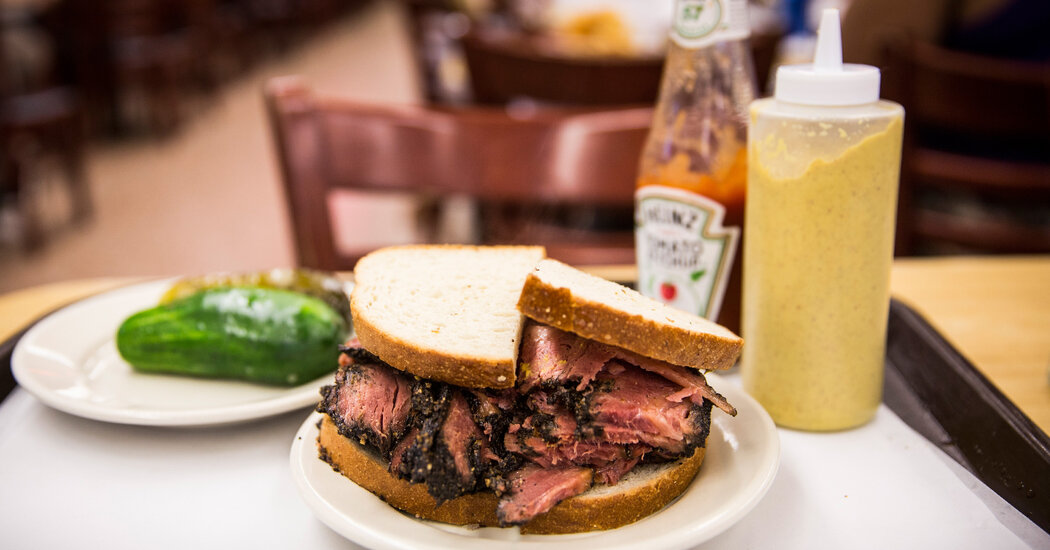
The Jewish deli is such a defining part of New York City that it might as well be the very air we breathe (along with pizza, dim sum, Trinidadian doubles and curbside halal).
On Friday, an exhibit about just that arrives at the New-York Historical Society on the Upper West Side. “‘I’ll Have What She’s Having’: The Jewish Deli” is “by all indications the most sweeping survey of this culinary institution attempted by a major museum,” Adam Nagourney wrote in The Times when the show made its debut in Los Angeles this summer.
The current state of the Jewish deli in New York City is shaky, given the closings of Stage Deli (2012), Carnegie Deli (2016), Fine & Schapiro (2020) and others. But there are still enough of them to overwhelm even the most determined diner, so I reached out to Jeffrey Yoskowitz, a co-author of “The Gefilte Manifesto: New Recipes for Old World Jewish Foods” and a self-styled deli obsessive who consulted on the deli exhibit. Here’s what he had to say.
Start With Katz’s and the Classics
“It’s called the secular synagogue for a reason,” Jeffrey told me. “It’s a place where you want to feel a connection to home.” First, he confirmed that Katz’s, on the Lower East Side, and its pastrami are not overhyped. (Also: Order the hot dog.) And don’t ever, ever call Russ & Daughters a deli — just read up on your appetizing traditions. He also recommended the Second Avenue Deli in Murray Hill, where his family ate when he was growing up (back when it was still on Second Avenue).
Inside, Second Avenue Deli looks no different from your favorite diner, right down to the all-ages crowd. Service is lightning fast, and in under an hour, you can enjoy matzo ball soup with the most beautiful pale bronze broth, a large onion-packed latke and a manageable pastrami on rye (perhaps a stinging rebuke to the monster pastramis of the nearby Sarge’s Deli). Dessert is free — two egg creams in shot glasses — though you should definitely grab a box of rainbow cookies on the way out.
Jeffrey also pointed me in the direction of Liebman’s Deli, the nearly 70-year-old restaurant in the Riverdale neighborhood of the Bronx, so I drove up to West 235th Street. At 11 a.m. on a Friday, the scene at Liebman’s was mostly older customers popping in to order matzo ball soup with two extra matzo balls, and “not too hot.” Order an early lunch of the No. 7 (thinly sliced pastrami and corned beef on rye with coleslaw and Russian dressing) and scarf it down in your car before driving through the Hudson Valley at peak fall foliage — or something like that.
Kreplach Soup, Deli Newcomers and the Next Generation
You might understandably be thinking, well, the Jewish deli is more than pastrami and matzo balls. True enough. As Jeffrey noted, it’s also kreplach soup, or beef dumplings, at P.J. Bernstein on the Upper East Side and the Mill Basin Deli in Brooklyn, one of a handful of kosher delis still “servicing a community the way that the old delis used to do it” — in proximity to those predominantly Jewish communities.
But traditions are changing, as at so-called designer delis. At Frankel’s Delicatessen & Appetizing in Greenpoint, Brooklyn, you can get a bacon, egg and cheese on challah, and similar counters are popping up in places like Houston and Richmond, Va. Different groups are also carrying the torch, like the Yemeni Muslim owners of the decades-old David’s Brisket House in Bedford-Stuyvesant, Brooklyn, who “serve exemplary Jewish deli sandwiches to a predominantly African American crowd,” as Betsy Andrews wrote in The Times in 2012.
Jeffrey said that David’s “encapsulates everything, the best of New York.” And who would deny New York the best?
In Other News …
-
This week, Pete Wells reviewed Nha Sang, a family-owned Tibetan restaurant in Elmhurst, Queens, that also specializes in Sichuan food, a reflection of the decades-long Chinese annexation of Tibet.
-
Openings: The Paris-born Brasserie Fouquet’s is now open at the Hotel Barrière Fouquet’s New York in TriBeCa; the space on West Houston Street that once housed Pegu Club is now Slava, a modern Ukrainian restaurant; and Figlia, a new destination for “neo-Neapolitan” pizza and pasta, opens tomorrow in Astoria.
-
Brunch has long been maligned by restaurateurs and chefs alike. But “The Big Brunch,” a new reality cooking show premiering this week on HBO Max, “approaches its contestants and its subject matter with a sense of ambition, geniality and optimism — all things that brunch, as a genre, has rarely seen,” Tejal Rao writes.
Email us at wheretoeat@nytimes.com. Newsletters will be archived here. Follow NYT Food on TikTok and NYT Cooking on Instagram, Facebook, YouTube and Pinterest.



